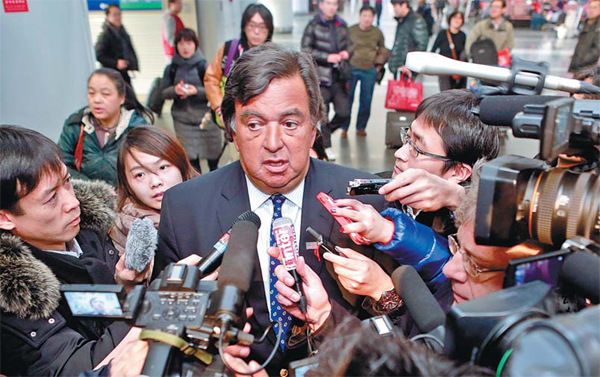A former senior US official who wrapped up a visit to Pyongyang with Google's chairman on Thursday said the message they sent about expanding use of technology there was "well received".
Bill Richardson, a former New Mexico governor and a former US ambassador to the United Nations, said they had been invited to return, which experts read as a signal of Pyongyang's goodwill toward the US and the outside world, and that the trip might create a new model of future interaction with Washington.
 |
|
Bill Richardson, former governor of New Mexico, is surrounded by journalists as he walks into the Beijing Capital International Airport in Beijing on Thursday. [Photo/China Daily] |
"The delegation's trip (to the Democratic People's Republic of Korea) was productive and successful," said Richardson on arriving at Beijing Capital International Airport after spending four days in the DPRK.
Richardson added, "We do expect to go back."
He said the delegation was bringing back the message that more openness would benefit the DPRK.
Also among the nine-member group was Google's chairman Eric Schmidt, the highest-profile US business executive to visit the country since DPRK leader Kim Jong-un took power one year ago.
Despite the visit being described as private, commentators suggested it could by no means be considered completely independent from the Obama administration.
Kim has made improving the economy a key national policy for 2013 and has demanded his people expand their knowledge of science and technology to reach that goal.
There are 1.5 million cellphone users in the DPRK, but access to the Internet is still limited among ordinary people.
During the trip, the delegation talked with students using the Internet at Pyongyang's elite Kim Il-sung University, and people using Intranet at the main library in Pyongyang, the Grand People's Study House.
Later, the delegation visited the Korea Computer Center, the hub of the DPRK's software and computer product development.
They learned about the DPRK's data encryption software, face recognition devices, video chatroom software and instant messaging services.
Local officials told the visitors the computer center is expecting to establish partnerships with other countries.
Wang Junsheng, a researcher in East Asian studies at the Chinese Academy of Social Sciences, said the trip sent a strong signal of goodwill from Pyongyang to Washington.
The visit had been criticized for appearing to hijack US diplomacy and boost Pyongyang's profile after the DPRK's recent rocket launch.
The US State Department had criticized the trip as "unhelpful" at a moment when Washington is rallying support for UN Security Council action against Pyongyang.
"Pyongyang has long sought to improve relations through unofficial ways," Wang said, and added that he was sure the US had been involved.
"The US is very good at public diplomacy, and high-ranking figures of US Internet companies have long kept close ties with the government."
He said the trip should be seen as a positive step toward the two nations getting to know each other better.
"Pyongyang has on the one hand said it wants to change, yet on the other, launched that satellite. Washington is unsure about its real intentions."
Gong Yuzhen, a global affairs professor at Peking University, said Google's involvement in the visit was largely symbolic, due to what is considered limited room for cooperation between it and the DPRK.
"Because of the sanctions, Google cannot operate in the DPRK legally," he said. "But in my view, Pyongyang is trying to set up relations with major powers to get rid of its isolation.
"However, it will by no means easily give up its nuclear activities and rocket launches," he added.
During the visit, the group said it called on Pyongyang to place a moratorium on the rocket launches and nuclear tests that have drawn UN sanctions.
Delegates also asked for fair and humane treatment for a US citizen who was arrested in November.
However, Richardson said he did not meet Pae Jun-ho, also known as Kenneth Bae, 44, who is in custody on suspicion of committing "hostile'' acts against the state.
Contact the writers at zhouwa@chinadaily.com.cn and lixiaokun@chinadaily.com.cn
AP contributed to this story.